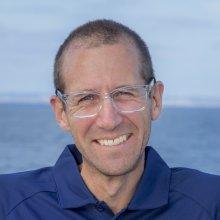
Brice Loose
Tell us about your work / research. What kinds of things do you do?
I study processes at the boundary between biogeochemistry and physical oceanography, with a strong focus on the polar oceans. I use geochemical tracers - mostly gases dissolved in seawater to study physical and biogeochemical processes. In the Arctic, I am studying how properties of sea ice affect the accumulation, transformation and exchange of gases like methane and carbon dioxide. For methane, microbial processes are a critical component. In the Southern Ocean, I study the interactions between deep water and cryosphere. This work impacts our understanding of the global carbon cycle and for sea level rise. I'm interested in advancing ocean instrumentation. I work with prototyping and design of low-cost sensors that connect to the Internet of Things using Open Source hardware. In Fall, 2016 I will teach a new course on this topic (OCG 404). I am also advancing the use of Underwater Mass Spectrometry to measure volatiles in water.
What sparked your initial interest in your career?
I grew up in the desert southwest where water was always scarce, but also lavishly consumed. When I moved to California for college, I came to appreciate the ocean as the source and sink of all water, of the weather, of regional climate and, ultimately, of long-term climate. The ocean and its elemental cycles became my principal focus and I sought a career path that would let me study this part of the earth system. Ultimately, this led me to the ocean state - Rhode Island - and the Graduate School of Oceanography, which seems fitting to me.
Who influenced you or encouraged you the most?
Growing up in Los Alamos, New Mexico - the atomic city - I think had the most profound influence on my trajectory.
What element of your work / study do you think is the most fascinating?
I have been studying the polynyas - the persistent openings in sea ice, caused by incessant offshore winds in winter. These small, isolated regions produce the densest water in the world, which fills the deep sea. The ice and the ocean chemistry all act to determine what is in that water when it leaves the surface.
What other jobs led you to your current career?
I worked as a plumber and construction laborer in high school. I took winters off to work as a snowboard instructor in college, and I worked at Jiffy Lube. These jobs taught me that I like engineering and understand mechanical systems, I like to be have independence at work, and that I could make a living doing things that I really enjoy.
What are your degrees and certifications?
Bachelor of Science - UC Santa Barabara 1999; Masters of Engineering - Catholic University of Chile 2003. PhD - Geochemistry 2009.
What are your hobbies?
I run, sail and aspire to play the ukulele.
What advice would you give to someone who wants to have a career like yours?
You can be creative and entrepreneurial with your education. Its the mix of all your experiences that helps you discover what you want and takes you where you are. Learn to teach yourself new skills and ideas, recognize opportunities and to take them. When you set a goal, work very hard toward it.
How did you get involved with the Nautilus Exploration Program? How did you get on the ship?
Katy Croff Bell recruited me. This expedition needed another navigator and I have never participated in an ROV cruise, so I jumped at the chance.
Expeditions
Brice participated in the following Ocean Exploration Trust expeditions:
